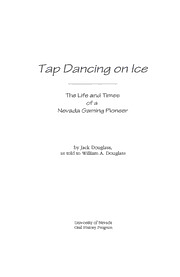
Tap Dancing on Ice: The Life and Times of a Nevada Gaming Pioneer PDF
Preview Tap Dancing on Ice: The Life and Times of a Nevada Gaming Pioneer
Tap Dancing on Ice: The Life and Times of a Nevada Gaming Pioneer Interviewee: Jack Douglass Interviewed: 1993-1996 Published: 1996 Interviewer: William A. Douglass UNOHP Catalog #170 ption gambling had been technically illegal in the state since 1910, but it was nonetheless going on m enly at the margins of Nevada society. In Reno Bill Graham and Jim McKay operated the Bank ement of the Golden Hotel. The property was owned by George Wingfield, the banking magnate w y the most powerful man in the state. Prior to 1910 Wingfield ran saloon gambling operations in Go er in Tonopah. With the quiet support of the Wingfield political machine Nevada liberalized both its orce laws in the name of economic survival for the state in the Great Depression. ision in 1931 by the Nevada state legislature to legalize casino gambling continues to reverberate aro s we approach the millennium. If anything, its implications and consequences loom larger at prese ime since Phil Tobin, a cow-county legislator from Winnemucca, introduced his enabling bill. er, like any oft-told tale, its more dramatic and spectacular aspects have acquired mythic proportions proportion readily becomes distortion and narration is obfuscation. For there is an entirely different ada gaming that is all but ignored: the small-scale, local variety that was prominent from 1931 thro World War II—what might be called the “pre-Las Vegas” era of modern Nevada gaming history. The t by Jack Douglass, a Tonopah native who began his gaming career in the mid-1930s with a pinball/ju chine route in central Nevada mining camps, affords unique insight into this early period. nt on to become a principal in several Reno, Lake Tahoe and Las Vegas casinos, and therefore po knowledge about the growth of the casino industry and some of its prominent players. But in this his story underscores the extent to which there was an “old Nevada” dimension (which continues aming history. For there is a sense in which the legalization of gaming was viewed as nothing mo ess opportunity by the residents of a state beset by economic crisis in its traditional mining and ra ies. Neither was it farfetched in terms of the Nevada mentality. Arguably, Nevadans were well-acq e importance of chance, luck, and fortune—whether in searching for elusive mineral wealth or pu ure in one of the nation’s harshest environments. Nor were Nevadans, with their fetish for indepe reliance, particularly concerned with their image. In the internal debates over legalizing prize fights, s or gambling, the obvious drawback of becoming America’s pariah state failed to carry the day. ory is that of a gaming entrepreneur who used the resources, largely human, at his disposal as a t in his business success. His father’s reputation as a respectable central Nevada mining figure (until h (Continued on nex ption (continued) ) opened many doors. As Jack sought “locations” in which to put his equipment, being Billy Dougla h an excellent reference and instant credential. Simply being a Tonopah native had its own signi ortune magazine article, published in 1934, stated, “Everybody who ever was anybody in Nevad onopah.” (Reference is to the dominance of the Tonopah-Goldfield area in Nevada affairs during t of the twentieth century and the subsequent dispersal of their key players when the mining boom mainly to the Reno-Carson City area.) Whether forging friendships during his brief stay at the Un ada, seeking to expand his route from Tonopah to Reno or making casino deals in the Reno marke s relations intersected constantly with his kinship ties and longstanding friendships, most of them gr onopah upbringing. He hired his brothers, cousins, and fellow schoolmates, and formed a partnersh avanaugh, another Tonopah native, to develop real estate and the Club Cal-Neva casino project in th Thus, while Jack has seldom returned to Tonopah over the past fifty years, even for a visit, he has nev nded his Tonopah origins. the following account is a cameo that portrays a different Nevada gaming history—its homegrown not necessarily the stuff out of which to fashion Hollywood epics, it is nevertheless essential t anding of the state and its people. “After a couple of stiff recording sessions we hit our stride as we entered into our most productive collaboration . . .” Jack (left) and William A. Douglass.
